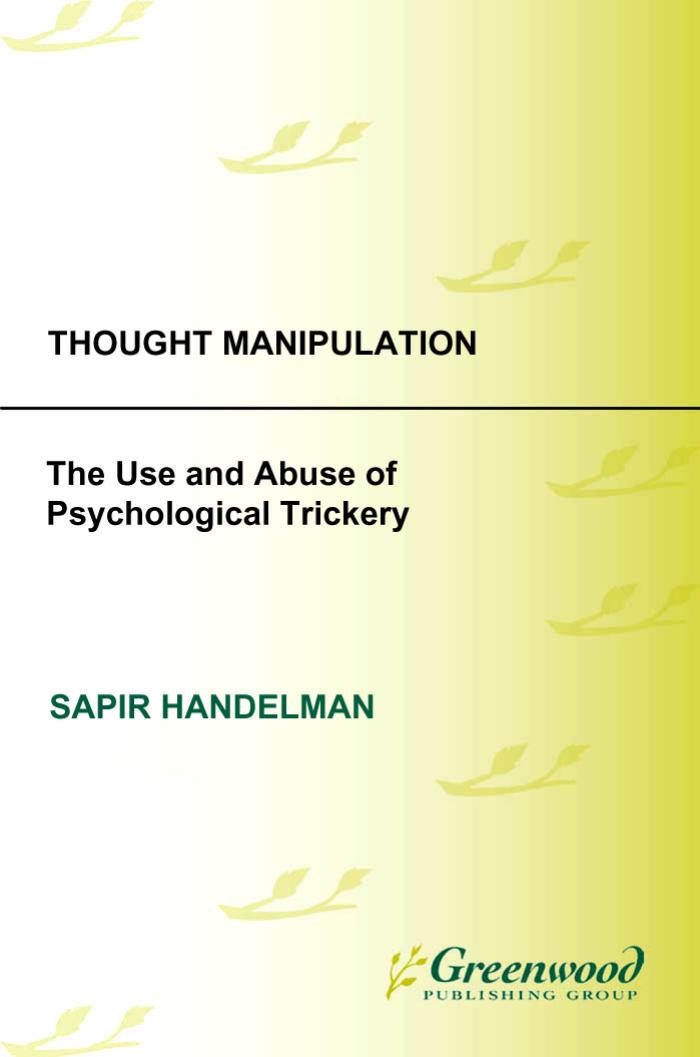Thought Manipulation: The Use and Abuse of Psychological Trickery by Sapir Handelman

Author:Sapir Handelman [Handelman, Sapir]
Language: eng
Format: epub, pdf
Tags: Psychology, Reference, Social Sciences, Abuse & Physical Violence, Nonfiction, Education
ISBN: 9780313355325
Publisher: Praeger
Published: 2009-05-15T07:00:00+00:00
CHAPTER 7
Spotlight on Politics: Intellectual Manipulation
INTRODUCTION
In contrast to limiting emotional manipulations, which are intended to lead the target to act impulsively and reflexively, limiting intellectual manipulations are constructed to supply the target with a compelling reason to behave in a way that the manipulator favors. The intention in limited intellectual manipulations is to lead the target to use reason and to act from rational considerations. However, the more interesting cases raise some severe doubts about whether the term “rationality” is appropriate. On the one hand, it is clear that the target is acting out of reason and critical thinking. On the other hand, his world view is partial, limited, and biased.
The manipulator is trying to create, or more precisely to keep, a substantial gap between the scope of the target’s world view and his field of vision. The manipulator strives to maneuver the target to act in a rational manner in the context and framework of the target’s “limited” world view. However, an examination of the bigger picture indicates that it is often difficult to accept the idea that the target is acting rationally, especially in cases where it is not clear whether the target is acting out of a free choice or whether “someone else” is maneuvering him by playing upon his human weaknesses.
MANIPULATION, PROPAGANDA, AND SOCIAL CRISIS
Statecraft is not an easy profession. The dynamic complexity of social life, often enough, invites infinite social problems and various unexpected crises. Therefore, it is not surprising to find political candidates who lack a well-thought strategy to cope with the difficulties, establishing their campaign upon incisive criticism of the present governmental policy. This strategy makes it hard to draw the line between “real” criticism and “pure” propaganda. On the one hand, the critique can indeed turn upon the real failures of the incumbent regime, but to criticize without suggesting any alternative, especially in politics, smacks of propaganda. I propose to label a political campaign that is based on criticism without proposing constructive advice the “manipulative criticism” tactic.
Principally, it seems all the easier to criticize than to offer alternative solutions, especially when there really is nothing to offer. Manipulative criticism is intended to give the impression of a sharp critic who has magical solutions to the urgent problems at stake while, in practice, he himself is confused and hardly knows where to start. Many times the manipulative challenger, hypocritically and surreptitiously, even supports the very same unpopular moves of the incumbent regime that he does not hesitate to attack and criticize in any possible public occasion.
As much as the political situation deteriorates, it seems easier to build an image of magical rescuer, but in practice the manipulative politician does not have any concrete alternative blueprint. Unfortunately, desperate people might vote for a politician who offers hope without examining critically if he has any concrete strategy or if he offers mere empty rhetoric. In these painful cases, the public recoils from confronting the “critical rescuer” for fear of banishing the little hope that his rhetoric proposes.
Download
Thought Manipulation: The Use and Abuse of Psychological Trickery by Sapir Handelman.pdf
This site does not store any files on its server. We only index and link to content provided by other sites. Please contact the content providers to delete copyright contents if any and email us, we'll remove relevant links or contents immediately.
Rewire Your Anxious Brain by Catherine M. Pittman(18643)
Talking to Strangers by Malcolm Gladwell(13347)
The Art of Thinking Clearly by Rolf Dobelli(10453)
Mindhunter: Inside the FBI's Elite Serial Crime Unit by John E. Douglas & Mark Olshaker(9319)
Becoming Supernatural by Dr. Joe Dispenza(8200)
Change Your Questions, Change Your Life by Marilee Adams(7759)
Nudge - Improving Decisions about Health, Wealth, and Happiness by Thaler Sunstein(7692)
The Road Less Traveled by M. Scott Peck(7594)
The Lost Art of Listening by Michael P. Nichols(7494)
Mastermind: How to Think Like Sherlock Holmes by Maria Konnikova(7323)
Enlightenment Now: The Case for Reason, Science, Humanism, and Progress by Steven Pinker(7306)
Win Bigly by Scott Adams(7183)
The Way of Zen by Alan W. Watts(6600)
Daring Greatly by Brene Brown(6501)
Big Magic: Creative Living Beyond Fear by Elizabeth Gilbert(5754)
Grit by Angela Duckworth(5604)
Ego Is the Enemy by Ryan Holiday(5413)
Men In Love by Nancy Friday(5234)
The Laws of Human Nature by Robert Greene(5172)
